The topic of cats and lactose intolerance is a pertinent subject that demands careful consideration among pet owners.
While the image of a feline companion lapping up a bowl of milk may be endearing, the reality is far more complex. Understanding the physiological limitations of cats when it comes to digesting lactose unveils a crucial aspect of feline health that often goes overlooked.
By delving into the intricacies of cats' digestive systems and the adverse effects of lactose on their well-being, a deeper appreciation for the reasons why milk and kitties do not form a harmonious dietary combination emerges, urging a reevaluation of feeding practices for our beloved feline friends.
Key Takeaways
- Cats are lactose intolerant due to losing the ability to process lactose after weaning.
- Feeding cats milk can lead to digestive upset like diarrhea and vomiting.
- Some cats may tolerate milk better, but it offers no nutritional benefits.
- Fresh water and nutritionally-appropriate cat food are essential for a healthy feline diet.
Cats and Lactose Intolerance
Cats are inherently lactose intolerant, making milk consumption a potential cause of digestive issues for them. Lactose, a sugar found in milk, can lead to diarrhea, vomiting, bloating, and flatulence in cats. While some may not exhibit immediate symptoms, lactose can still draw water into the intestine, causing gastrointestinal discomfort.
After weaning, cats lose the ability to efficiently process lactose, making milk a non-essential part of their diet. Although cats may enjoy the taste of milk, it offers no significant nutritional benefits and can contribute to weight gain and obesity. Veterinary nutritionists advise against feeding cats milk and recommend providing fresh water and nutritionally balanced cat food as alternatives for a healthy feline diet.
Lactose Intolerance in Adult Mammals
In adult mammals, including humans and various animal species, lactose intolerance is a common digestive issue caused by the inability to efficiently digest lactose, a sugar found in milk. This condition results from a deficiency of lactase, the enzyme responsible for breaking down lactose into simpler sugars for absorption.
Without enough lactase, undigested lactose ferments in the gut, leading to symptoms like bloating, flatulence, diarrhea, and abdominal discomfort. While some individuals may tolerate small amounts of lactose, many mammals, including cats, lose the ability to digest lactose effectively after weaning.
Therefore, it is important to be mindful of lactose content when considering milk or dairy products as part of an adult mammal's diet to prevent digestive issues.
Risks of Feeding Cats Milk
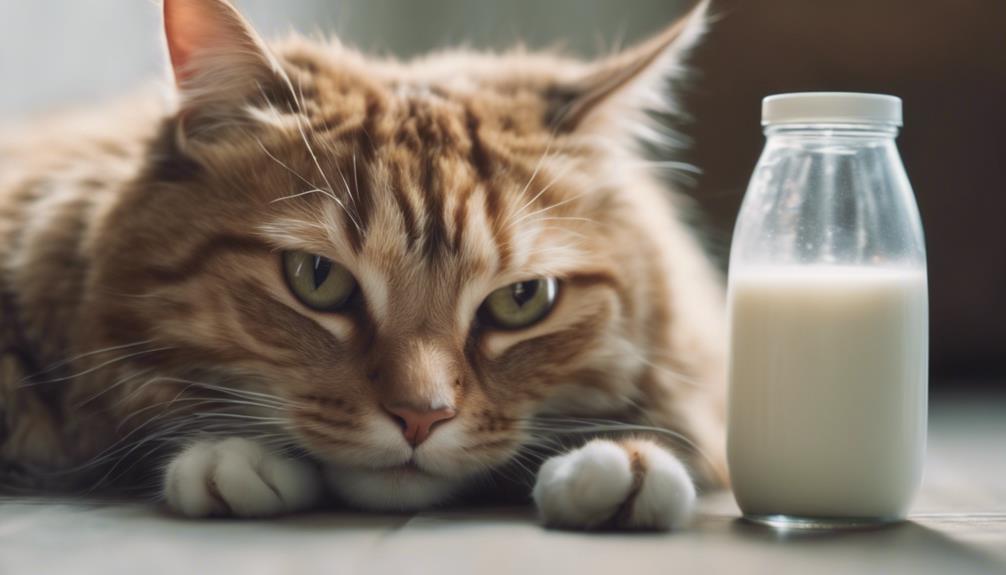
After discussing lactose intolerance in adult mammals, it is crucial to understand the risks associated with feeding milk to cats, as it can have adverse effects on their digestive health.
While some cats may enjoy the taste of milk, it holds no nutritional value for them. In fact, milk lacks essential nutrients required for a cat's balanced diet and can lead to digestive issues like diarrhea, vomiting, bloating, and flatulence due to their inability to process lactose efficiently.
Feeding cats milk as a regular treat can also contribute to weight gain and obesity. To ensure optimal health for your feline companion, it is recommended to stick to fresh water and nutritionally-appropriate cat food, limiting milk as an occasional indulgence.
Cats' Inability to Process Lactose
The enzymatic capacity of felines to digest lactose diminishes significantly after weaning. Cats' inability to process lactose stems from a decrease in lactase production, the enzyme responsible for lactose digestion. This leads to lactose intolerance in most adult cats, causing digestive issues when consuming dairy products.
Understanding this limitation is crucial for providing appropriate nutrition to our feline companions. To navigate this dietary restriction effectively, consider the following:
- Cats lack the necessary enzymes to break down lactose efficiently.
- Consuming lactose-containing products can lead to gastrointestinal discomfort.
- Offering lactose-free alternatives ensures optimal digestion for cats.
- Regular water intake is essential to maintain hydration for cats.
- Consult with a veterinarian for tailored dietary recommendations based on your cat's specific needs.
Symptoms of Lactose Intolerance
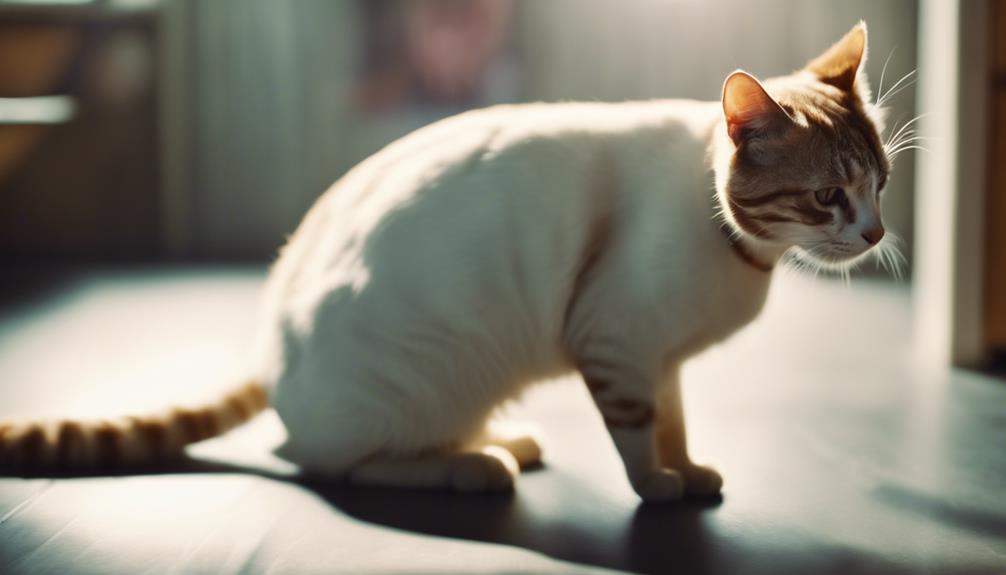
Symptoms indicative of lactose intolerance in cats may manifest subtly or with pronounced gastrointestinal distress. Cats experiencing lactose intolerance may show signs such as diarrhea, vomiting, flatulence, or bloating. These symptoms can vary in intensity, with some cats being more sensitive to lactose than others.
It is essential for cat owners to monitor their pets for any digestive issues that may arise after consuming milk or dairy products. While some cats may not display any obvious symptoms of lactose intolerance, it is crucial to remember that lactose can still cause discomfort and digestive upset in felines. Understanding these symptoms can help cat owners make informed decisions about their pets' diets and overall well-being.
Effects of Undigested Sugars on Cats
Upon ingestion, undigested sugars from lactose in milk can lead to gastrointestinal disturbances in cats. These undigested sugars can have various effects on your feline friend, such as:
- Diarrhea: The presence of undigested sugars draws water into the intestine, resulting in loose stools.
- Vomiting: Cats may exhibit vomiting as their bodies try to rid themselves of the lactose.
- Discomfort: Gassiness and bloating can occur due to lactose fermentation in the gut.
- Dehydration: Excessive diarrhea caused by undigested sugars can lead to dehydration.
- Nutritional Deficiencies: Cats that consume milk lacking essential nutrients may suffer from imbalances in their diet.
Impact of Lactose Fermentation
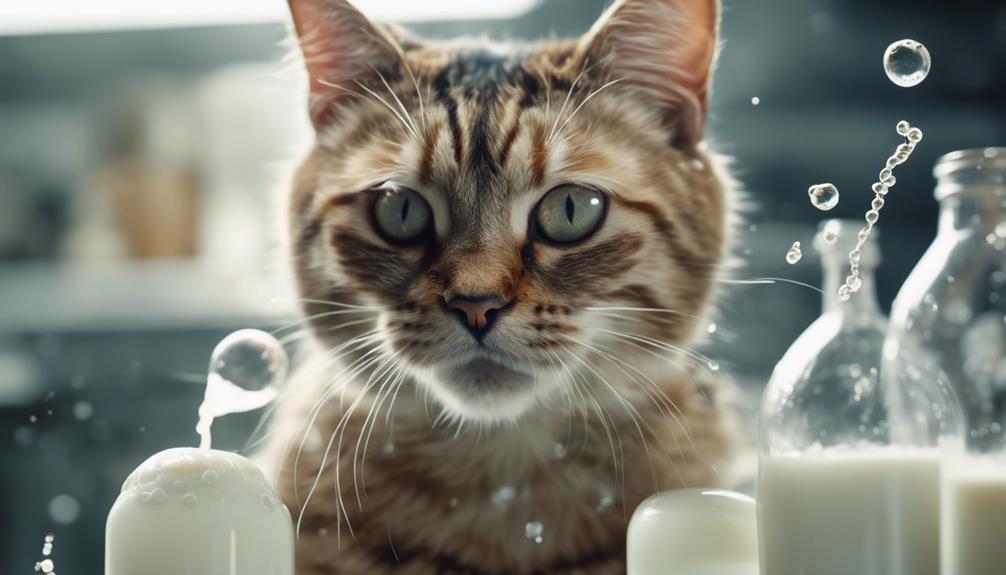
Lactose fermentation in cats' digestive systems can lead to gastrointestinal discomfort and digestive disturbances. When lactose, the sugar found in milk, is not properly digested by cats due to lactose intolerance, it ferments in the gut. This fermentation process produces gases and can lead to symptoms like bloating and flatulence in felines.
The presence of undigested lactose in the intestines also draws water into the gut, causing diarrhea in some cats. These uncomfortable effects highlight the importance of avoiding dairy products, such as milk, in a cat's diet.
Variability in Cats' Milk Tolerance
The tolerance levels of cats towards milk can vary significantly among individual felines. While some cats may handle milk without any issues, others may experience digestive upset. Here are some factors that contribute to the variability in cats' milk tolerance:
- Genetics play a role in determining a cat's ability to digest lactose.
- Kittens generally have higher lactase levels, enabling better milk digestion.
- Some cats may develop lactose intolerance as they age.
- The quantity of milk consumed can influence how a cat's digestive system reacts.
- Individual differences in gut bacteria can impact how well a cat can tolerate lactose.
Nutritional Value of Milk for Cats
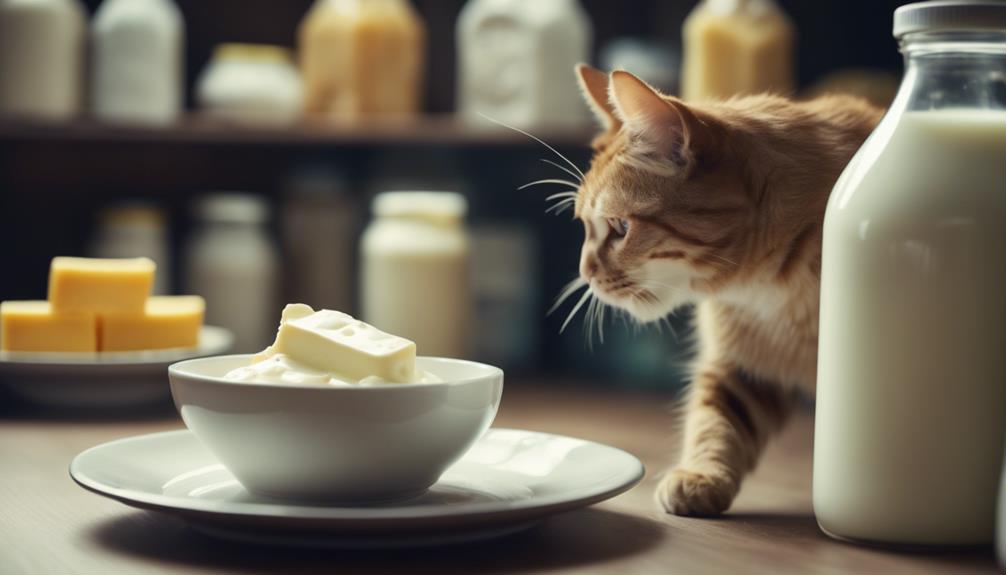
Cats' tolerance levels towards milk vary widely, prompting a closer examination of the nutritional value milk provides to these feline companions. Milk is often seen as a source of nourishment due to its association with mother cats nursing kittens. However, in reality, milk lacks essential nutrients required for adult cats.
While cats may enjoy the taste of milk, it does not offer significant benefits in terms of their overall health. Cats require a diet rich in proteins, fats, vitamins, and minerals which are not adequately provided by milk. Feeding cats milk as a treat is acceptable in moderation but should not be relied upon as a primary source of nutrition to ensure their well-being and prevent potential health issues.
Consequences of Feeding Cats Milk
Feeding milk to felines can lead to adverse effects on their digestive health. When considering offering milk to your cat, it's essential to be aware of the potential consequences:
- Digestive upset: Milk can cause diarrhea or vomiting in lactose-intolerant cats.
- Dehydration: Undigested sugars in lactose draw water into the intestine, leading to diarrhea.
- Bloating and flatulence: Lactose fermentation in the gut can cause discomfort.
- Weight gain: Milk holds no nutritional value and can contribute to obesity.
- Nutritional deficiencies: Cats require a balanced diet with fresh water and appropriate cat food for optimal health.
Importance of Fresh Water for Cats
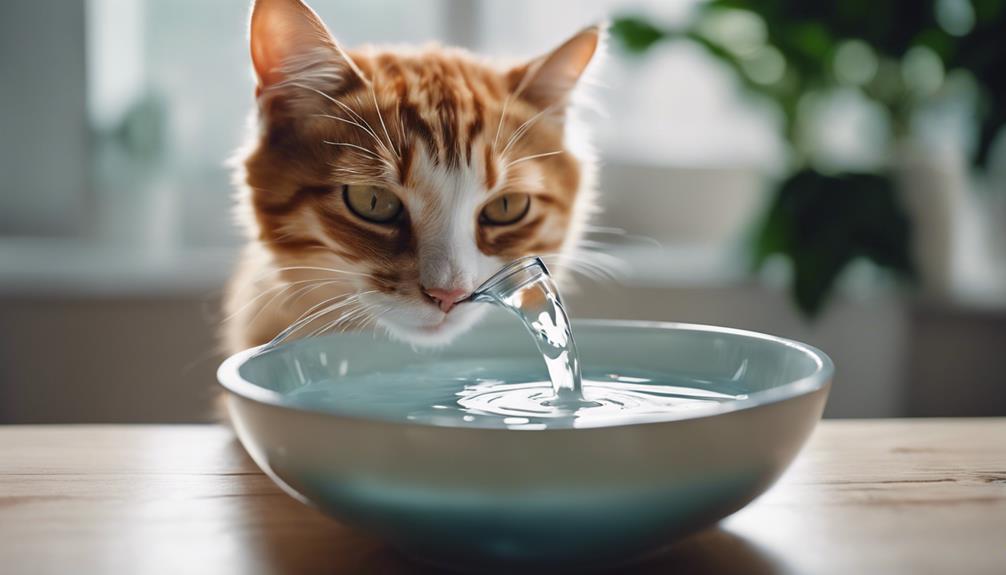
Ensuring a daily supply of fresh water is essential for maintaining optimal hydration levels in felines. Cats, like all animals, rely on water to support various bodily functions, including digestion, circulation, and temperature regulation.
Water intake is particularly crucial for cats as they have a low thirst drive compared to other animals. Providing fresh water in a clean bowl at all times encourages cats to stay adequately hydrated.
Dehydration in cats can lead to serious health issues, such as urinary tract problems and kidney issues. To promote your cat's well-being, make sure to monitor their water intake and replenish their water source regularly.
Managing Treats in Cat's Diet
An essential aspect of maintaining a cat's dietary balance lies in effectively regulating the inclusion of treats. When managing treats in your cat's diet, consider the following tips:
- Treats should only make up a small portion of your cat's daily caloric intake.
- Opt for healthy, low-calorie treats such as freeze-dried meat or catnip.
- Monitor your cat's weight and adjust treat amounts accordingly to prevent obesity.
- Avoid giving human food as treats, as it can be harmful to cats.
- Consult with your veterinarian to determine the best treat options for your cat's specific dietary needs.
Alternatives to Milk for Cats
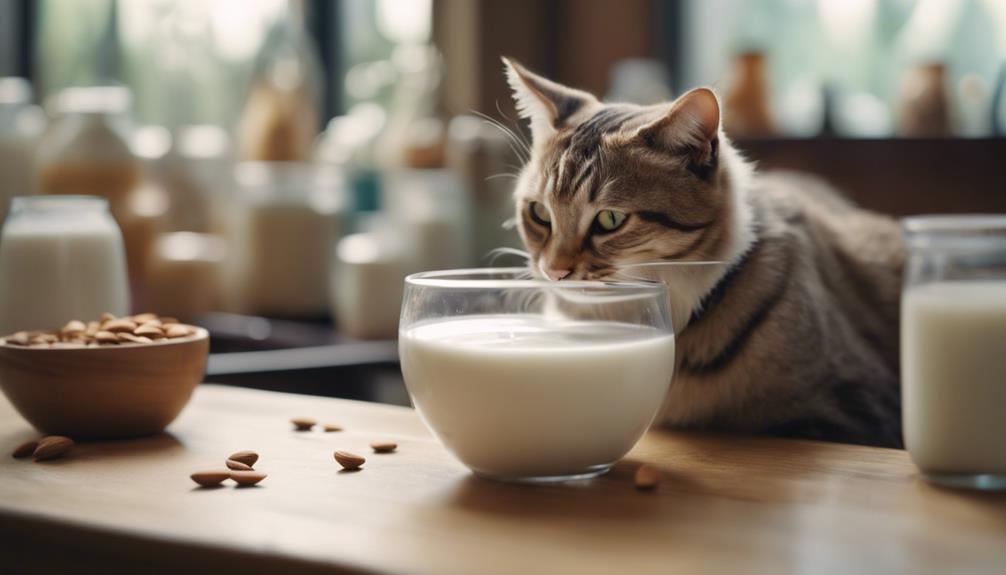
When considering the dietary needs of cats, it is important to explore suitable alternatives to milk that offer nutritional value without compromising feline health. Cats require fresh water daily and nutritionally-appropriate cat food for a balanced diet.
While milk can be a treat, it should not be a dietary staple due to lactose intolerance. Limit treats, including milk, to 10% of a cat's total daily calories to prevent weight gain and obesity. For kittens, specially formulated kitten milk replacement can be considered for bottle-fed individuals.
It is advisable to consult a veterinarian or veterinary nutritionist for guidance on maintaining a healthy diet tailored to your cat's specific needs. Opting for alternatives to milk ensures that your cat receives the necessary nutrients without the risk of digestive issues associated with lactose intolerance.
Seeking Professional Advice for Cat Nutrition
For optimal guidance on meeting your cat's nutritional needs, consulting a veterinarian or veterinary nutritionist is essential. These professionals can provide personalized advice tailored to your cat's specific requirements. Here are five key reasons why seeking professional advice for cat nutrition is crucial:
- Veterinarians can assess your cat's overall health and recommend suitable dietary options.
- Veterinary nutritionists have specialized knowledge in formulating balanced diets for cats.
- Professional guidance can help prevent nutritional deficiencies or excesses that may harm your cat.
- Regular consultations ensure that your cat's diet evolves with their changing life stages and health conditions.
- Professionals can offer advice on choosing appropriate commercial cat foods or preparing homemade diets to meet your cat's nutritional needs effectively.
Conclusion
In conclusion, cats' lactose intolerance is a significant factor to consider when planning their diet. With approximately 65% of adult mammals being lactose intolerant, it is crucial to understand the risks associated with feeding cats milk.
Recognizing the symptoms of lactose intolerance and providing fresh water as an alternative are key steps in promoting feline health. Seeking professional advice for cat nutrition can help ensure that cats receive a balanced diet that meets their specific dietary needs.




